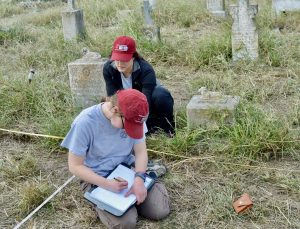As we approach this coming field season, I sit here with a house full of people I love and a heart full of conflicting emotions. I am so lucky to have been born into such a privileged family. We are celebrating the holidays in the comfort of a warm home with plenty of food, water, shelter, coats, shoes, and unnecessary luxuries that we are so fortunate to have been able to obtain through hard work and circumstance. Every year when I visit home, I am able to tell the people in my life what wonderful things I have been able to accomplish and experience through my graduate program. I am able to experience the positive correlation of “hard work” that “pays off” in a way that many people in the world may never be able to, simply because I am an American citizen.
I recently read the creative non-fiction, Looking for Esperanza, which tells the stories of various migrant women who the author encountered while searching for Esperanza. She attempts to understand some of the hardships these women encounter in their lives here in America by joining them to work in the strawberry fields in Florida to experience their daily lives firsthand. She struggled to labor under the scolding hot sun, planting hundreds of pounds of strawberries throughout the day for minimal pay. This is one of the many forms of intense manual labor that these women face in exchange for minimal wages that pay for tortillas and trailers to feed and support their families.
Last January, I participated in my first field season with Beyond Borders. To us, moving enormous amounts of rigid, compact soil from the ground was quite difficult. Our bodies became sore, and we were burning through calories which made us hungry throughout the day. When it was cold, we had the clothing we desired. When it was hot, we had the water we thirsted for. When we were hungry, we had the security of a nutritious meal in our foreseeable future. We realized how fortunate we were, so we always carried on with our positive attitudes, hopeful to make a difference in somebody’s life.
This January, I will return to South Texas with Beyond Borders to continue our mission. Being able to participate in the project last year was a career-changing opportunity for me. One of the biggest reasons I wanted to go to the University of Indianapolis was with the intention of volunteering and learning how forensic anthropologists can help with humanitarian issues taking place around the world. Not only did I get a glimpse into the struggles and conditions faced near the U.S.-Mexico border, but I witnessed the difficulty in regulating the treatment and processing of the many individuals who perish on their journey.
I imagine this trip will be quite different from my last. This time, I will have a team member as my mapping apprentice, who I will be teaching the basic principles of field documentation in forensic archaeological contexts. Learning to map at this time last year was critical for my involvement in cases at UIndy and has provided me with many great opportunities that I am excited to share with another student. In addition, exhumations will resume at Sacred Heart Cemetery in Falfurrias, which will be different from my previous experience on the private property we worked on last year. Since we are returning to Falfurrias, we already have plans to meet with some incredible individuals in the community who will have a unique perspective to share with us. Our team with be

immersed in the sociopolitical climate in a way that I have not experienced before. This is why I believe the biggest difference of all will be the depth of understanding that I bring away from the things I witness and people I meet this season. I am excited to continue building my ever-growing emotional connection with this crisis and cannot wait to return.